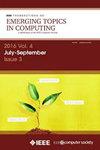Adversarial Attacks Assessment of Salient Object Detection via Symbolic Learning
IF 5.1
2区 计算机科学
Q1 COMPUTER SCIENCE, INFORMATION SYSTEMS
IEEE Transactions on Emerging Topics in Computing
Pub Date : 2023-09-22
DOI:10.1109/TETC.2023.3316549
引用次数: 0
Abstract
Machine learning is at the center of mainstream technology and outperforms classical approaches to handcrafted feature design. Aside from its learning process for artificial feature extraction, it has an end-to-end paradigm from input to output, reaching outstandingly accurate results. However, security concerns about its robustness to malicious and imperceptible perturbations have drawn attention since its prediction can be changed entirely. Salient object detection is a research area where deep convolutional neural networks have proven effective but whose trustworthiness represents a significant issue requiring analysis and solutions to hackers’ attacks. Brain programming is a kind of symbolic learning in the vein of good old-fashioned artificial intelligence. This work provides evidence that symbolic learning robustness is crucial in designing reliable visual attention systems since it can withstand even the most intense perturbations. We test this evolutionary computation methodology against several adversarial attacks and noise perturbations using standard databases and a real-world problem of a shorebird called the Snowy Plover portraying a visual attention task. We compare our methodology with five different deep learning approaches, proving that they do not match the symbolic paradigm regarding robustness. All neural networks suffer significant performance losses, while brain programming stands its ground and remains unaffected. Also, by studying the Snowy Plover, we remark on the importance of security in surveillance activities regarding wildlife protection and conservation.通过符号学习评估突出物体检测的对抗性攻击
机器学习是主流技术的核心,它优于传统的手工特征设计方法。除了人工特征提取的学习过程外,机器学习还具有从输入到输出的端到端范式,可获得出色的精确结果。然而,由于它的预测可以完全改变,因此它对恶意和不易察觉的扰动的鲁棒性引起了安全方面的关注。突出物体检测是深度卷积神经网络已被证明有效的一个研究领域,但其可信度是一个重大问题,需要分析和解决黑客攻击。大脑编程是一种与传统人工智能一脉相承的符号学习。这项研究证明,符号学习的鲁棒性对设计可靠的视觉注意力系统至关重要,因为它甚至可以承受最强烈的干扰。我们使用标准数据库和现实世界中描绘视觉注意力任务的雪鸻岸鸟问题,测试了这种进化计算方法是否能抵御几种对抗性攻击和噪声扰动。我们将我们的方法与五种不同的深度学习方法进行了比较,证明它们在鲁棒性方面与符号范式并不匹配。所有神经网络的性能都有明显下降,而大脑编程却能站稳脚跟,不受影响。此外,通过研究雪鸻,我们还指出了野生动物保护和保育监控活动中安全的重要性。
本文章由计算机程序翻译,如有差异,请以英文原文为准。
求助全文
约1分钟内获得全文
求助全文
来源期刊

IEEE Transactions on Emerging Topics in Computing
Computer Science-Computer Science (miscellaneous)
CiteScore
12.10
自引率
5.10%
发文量
113
期刊介绍:
IEEE Transactions on Emerging Topics in Computing publishes papers on emerging aspects of computer science, computing technology, and computing applications not currently covered by other IEEE Computer Society Transactions. Some examples of emerging topics in computing include: IT for Green, Synthetic and organic computing structures and systems, Advanced analytics, Social/occupational computing, Location-based/client computer systems, Morphic computer design, Electronic game systems, & Health-care IT.
 求助内容:
求助内容: 应助结果提醒方式:
应助结果提醒方式:


